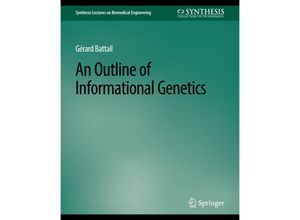Heredity performs literal communication of immensely long genomes through immensely long time
intervals. Genomes nevertheless incur sporadic errors referred to as mutations which have
significant and often dramatic effects after a time interval as short as a human life. How can
faithfulness at a very large timescale and unfaithfulness at a very short one be conciliated?
The engineering problem of literal communication has been completely solved during the second
half of the XX-th century. Originating in 1948 from Claude Shannon's seminal work information
theory provided means to measure information quantities and proved that communication is
possible through an unreliable channel (by means left unspecified) up to a sharp limit referred
to as its capacity beyond which communication becomes impossible. The quest for engineering
means of reliable communication named error-correcting codes did not succeed in closely
approaching capacity until 1993 when Claude Berrou and Alain Glavieux invented turbocodes. By
now the electronic devices which invaded our daily lives (e.g. CD DVD mobile phone digital
television) could not work without highly efficient error-correcting codes. Reliable
communication through unreliable channels up to the limit of what is theoretically possible has
become a practical reality: an outstanding achievement however little publicized. As an
engineering problem that nature solved aeons ago heredity is relevant to information theory.
The capacity of DNA is easily shown to vanish exponentially fast which entails that
error-correcting codes must be used to regenerate genomes so as to faithfully transmit the
hereditary message. Moreover assuming that such codes exist explains basic and conspicuous
features of the living world e.g. the existence of discrete species and their hierarchical
taxonomy the necessity of successive generations and even the trend of evolution towards
increasingly complex beings. Providing geneticists with an introduction to information theory
and error-correcting codes as necessary tools of hereditary communication is the primary goal
of this book. Some biological consequences of their use are also discussed and guesses about
hypothesized genomic codes are presented. Another goal is prompting communication engineers to
get interested in genetics and biology thereby broadening their horizon far beyond the
technological field and learning from the most outstanding engineer: Nature. Table of
Contents: Foreword Introduction A Brief Overview of Molecular Genetics An Overview of
Information Theory More on Molecular Genetics More on Information Theory An Outline of
Error-Correcting Codes DNA is an Ephemeral Memory A Toy Living World Subsidiary
Hypothesis Nested System Soft Codes Biological Reality Conforms to the Hypotheses
Identification of Genomic Codes Conclusion and Perspectives

